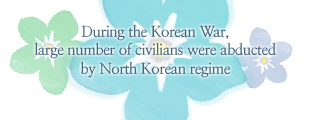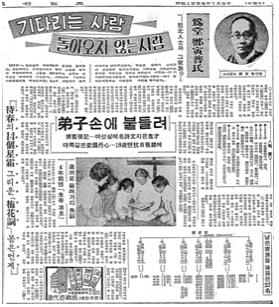Name: admin
2014-01-02 15:32:26 | Hit 2205
Those who wait, those who never came back
Widang Jeong In-bo
Civilian abductees and their families
P.3, Chosun Daily, Jul. 5, 1964
○ The most prominent figure in the world of Chinese classics, WidangJeong In-bo, an amicable man of strong character, was one of many people abducted by North Korea. Respected and adored by Koreans as a fine scholar, historian and poet, he is reported to have shown brilliant talent and extraordinary disposition since childhood. He studied Chinese characters at the age of 3. Widang began to read his ancestors’ medical examination reports in just a year, to the great surprise of his father Jeong Eon-jo, whothen hired a teacher for his son.
His wife, Jo A-gi, continued her story based on what she heard from her husband. Widang wrote poetry and prose when he was six and showed it to his teacher, who was greatly shocked. “A geniushas been born,”exclaimed the teacher, who framed the work and hung it in his study until it was stolen during the Korean War. As such, Widang became the talk of the town and was regarded as an infant prodigy. At the age of 6, by which time he was already married, he saw his old servants lamenting the fact that they were illiterate, so he taught them how to read.
○ When Korea was annexed by Japan, Widang, who went to Shanghai to study at the age of 18, launched an independence movement under the name of “Dongjesa” with the late Lee Si-yeong and Kim Chang-suk. Upon his return to Korea at the age of 21, he taught as a professor of Korean Cultural Studies and Oriental Studies at the College of Buddhism, which later became Dongguk University, as well as at Yeonhui College, Ewha College and Severance Medical School. He also imbued the public with patriotism as an editorialist atSidae Daily and other newspapers.
During his career, Widang published many books, including Studies on the History of the Joseon Dynasty, The Origin of Joseon Literature, and Collection of Seopwon Poetry. There is a famous anecdote about Widang’s determination. When Yukdang Choe Nam-seon published a poetry collection called The 108 Torments of Mankind and became widely known as a man of erudition, Widang, who hated coming second, quickly published similar poetry. After Korea’s liberation from Japan, Widang became the dean of Korean Studies University and also assumed the position of Inspection Chairman, which he had to resign due to illness. On July 18, 1953, he was abducted and taken to North Korea by his student.
○ Heartbroken at the abduction of her husband, Widang’s wife Jo A-gi evacuated to Busan with her 7 children during the Retreat on January 4, so that she would not have to experience the ordeal of North Korean communist rule again. But Jo then suffered another loss, that of her beloved third son, Hong-mo (age 22), a first lieutenant, who fought at the front line in Busan. Moreover, when she came back to Seoul through Nonsan, a house that her husband had bought in Namsan-dong was lost to an influential minister surnamed Im.
The family members, who all inherited their father Widang’s friendly and amiable personality, were always yielding to others and firmly upheld their principles and beliefs even in poverty. Currently, the eldest son, Yeon-mo (age 42), teaches at a middle school in Incheon; the second, Sang-mo (age 39), is a police affairs section chief at Seodae-mun Police Station; and the fourth, Yang-mo (age 31), works at the National Museum of Korea. His eldest daughter, Jung-wan, and his third daughter Yang-wan (37), are teachers at Dongduk Women's High School. His fourth daughter, Pyeong-wan (30), is a teacher at Hanyang Women's Middle and High School. They have all become teachers, fulfilling their father's wishes. He has 28 grandchildren, all of whom long to see him come home soon.
Widang Jeong In-bo
Civilian abductees and their families
P.3, Chosun Daily, Jul. 5, 1964
○ The most prominent figure in the world of Chinese classics, WidangJeong In-bo, an amicable man of strong character, was one of many people abducted by North Korea. Respected and adored by Koreans as a fine scholar, historian and poet, he is reported to have shown brilliant talent and extraordinary disposition since childhood. He studied Chinese characters at the age of 3. Widang began to read his ancestors’ medical examination reports in just a year, to the great surprise of his father Jeong Eon-jo, whothen hired a teacher for his son.
His wife, Jo A-gi, continued her story based on what she heard from her husband. Widang wrote poetry and prose when he was six and showed it to his teacher, who was greatly shocked. “A geniushas been born,”exclaimed the teacher, who framed the work and hung it in his study until it was stolen during the Korean War. As such, Widang became the talk of the town and was regarded as an infant prodigy. At the age of 6, by which time he was already married, he saw his old servants lamenting the fact that they were illiterate, so he taught them how to read.
○ When Korea was annexed by Japan, Widang, who went to Shanghai to study at the age of 18, launched an independence movement under the name of “Dongjesa” with the late Lee Si-yeong and Kim Chang-suk. Upon his return to Korea at the age of 21, he taught as a professor of Korean Cultural Studies and Oriental Studies at the College of Buddhism, which later became Dongguk University, as well as at Yeonhui College, Ewha College and Severance Medical School. He also imbued the public with patriotism as an editorialist atSidae Daily and other newspapers.
During his career, Widang published many books, including Studies on the History of the Joseon Dynasty, The Origin of Joseon Literature, and Collection of Seopwon Poetry. There is a famous anecdote about Widang’s determination. When Yukdang Choe Nam-seon published a poetry collection called The 108 Torments of Mankind and became widely known as a man of erudition, Widang, who hated coming second, quickly published similar poetry. After Korea’s liberation from Japan, Widang became the dean of Korean Studies University and also assumed the position of Inspection Chairman, which he had to resign due to illness. On July 18, 1953, he was abducted and taken to North Korea by his student.
○ Heartbroken at the abduction of her husband, Widang’s wife Jo A-gi evacuated to Busan with her 7 children during the Retreat on January 4, so that she would not have to experience the ordeal of North Korean communist rule again. But Jo then suffered another loss, that of her beloved third son, Hong-mo (age 22), a first lieutenant, who fought at the front line in Busan. Moreover, when she came back to Seoul through Nonsan, a house that her husband had bought in Namsan-dong was lost to an influential minister surnamed Im.
The family members, who all inherited their father Widang’s friendly and amiable personality, were always yielding to others and firmly upheld their principles and beliefs even in poverty. Currently, the eldest son, Yeon-mo (age 42), teaches at a middle school in Incheon; the second, Sang-mo (age 39), is a police affairs section chief at Seodae-mun Police Station; and the fourth, Yang-mo (age 31), works at the National Museum of Korea. His eldest daughter, Jung-wan, and his third daughter Yang-wan (37), are teachers at Dongduk Women's High School. His fourth daughter, Pyeong-wan (30), is a teacher at Hanyang Women's Middle and High School. They have all become teachers, fulfilling their father's wishes. He has 28 grandchildren, all of whom long to see him come home soon.






















 FAX : (82)31-930-6099
FAX : (82)31-930-6099
